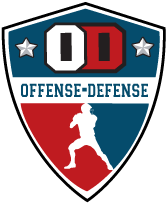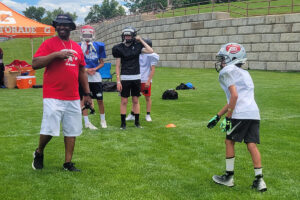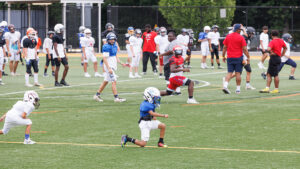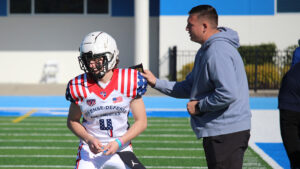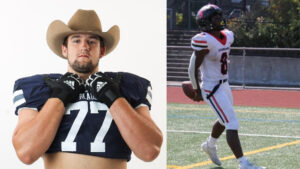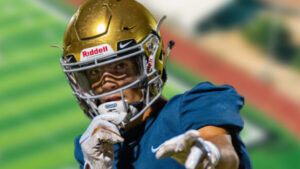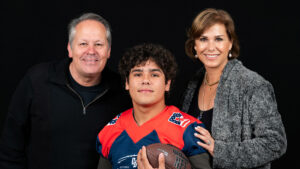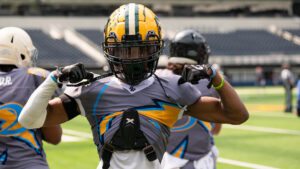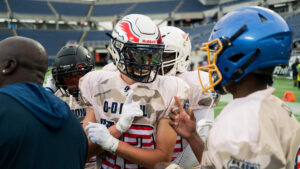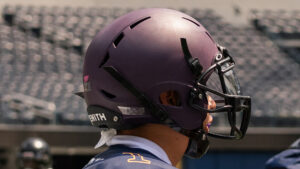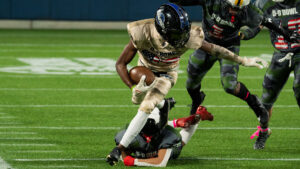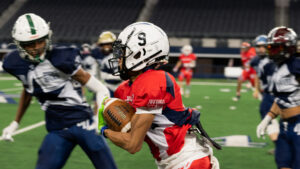The Line of Scrimmage Podcast is all about football! Tune is weekly to your host Coach Greg Quick to learn everything there is about the current state of football, history, top athletes, special guests and more on the all new podcast brought to by Offense-Defense Football.
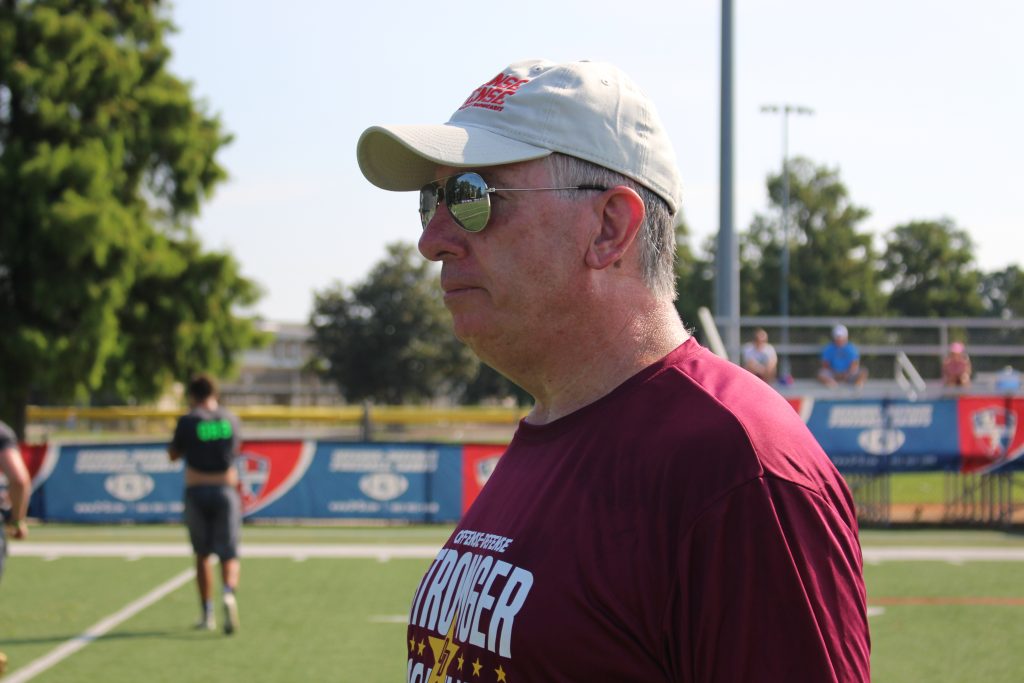
ABOUT COACH QUICK
Greg Quick is currently the Canadian Football League Director, Global Scouting. GQ has nearly four decades on the sidelines including high school, university and professional football. He has sixteen years as a university head coach in addition to coordinating both sides of the ball and tutoring linebackers to quarterbacks and everything in between. Coach Quick began his relationship with O-D in 1986. Greg and his wife, Jeannie, have six children and two grandchildren.
ABOUT THIS EPISODE
The Line of Scrimmage – Episode 1, State of Football 2020
Episode 1 Synopsis – State of Football 2020: Join Coach Quick as he does a deep dive into what’s happening in football today. It’s been a crazy 2020 and we are here to help you navigate the muddy waters of today’s new normal in regards to football, so sit back and take a listen to what Coach Quick has to say!
Speaker 2 (00:25):
Well, this is the line of scrimmage where we go each week. One-on-one with the issues facing football today. Hello, I’m Greg Quick and we’re powered by offense defense sports camps. You know, this week the president was quoted as saying, it’d be tragic mistake to cancel football in 2020. Are you with me? It’d be a tragic mistake to cancel football in 2020. I think we all agree, right. I think it’s hard to argue with the fact the impact that sport has on our society, not just the entertainment value, but the unifying value, the education value, the social value that it has in our society is, is really strong. And it would be tragic because I think it’s a major part of the resocialization of our society. Sport grants, us an opportunity to begin that process, not only in person, but, but remotely as well, because as we all enjoy sport, uh, by, in any venue or across any platform, uh, we’re, we’re doing it together.
Speaker 2 (01:20):
And I think it, it helps unite each of the segments of our population. Just as I said, the president it’d be tragic not to have football in 2020. You know what the irony of that statement is, is that it was made in 1905 as well. Teddy Roosevelt brought together football coaches, athletic directors, uh, other athletes, athletic advisors from around the country and brought them to the white house in 1905, not 2020, 1905. And he wanted to talk about, there were games. The game was being, uh, teams were suspending play. The games were being postponed and he wanted to talk about what was good for the game. How could the game, uh, really be re socialized in a way that was, would be more greatly accepted across the country, across society, you know, and from, from those discussions, the NCA was born and it was really the concept that the NCAA would help guide a sport, especially intercollegiate sport, uh, in our institutions of higher education to guarantee a quality of experience for all constituents.
Speaker 2 (02:22):
Well, now I don’t believe that the NCA has lived, uh, to that challenge, to that charge. Teddy Roosevelt charged the NCA with creating a system of sport in our country and it grew, and for a long time, it’s been really healthy, but now we’re starting to see it’s exposed some of the flaws in the system and be exposed to this pandemic through the social unrest in our country. And even in the threat of our players organizing, you know, the NCA, the presidents, the chancellors, the commissioners are all scared of the players organizing. They really believe at the amateur system, but does it, I really believe that our players have learned we’ve taught great leadership skills through sport. I think some of these players have stepped up now and they’re taking responsibility in the void created by the lack of action by the NCA, these very own student athletes, these student athletes that are to be served by the NCA and by sport in our heart institutes, higher education are being well served by the leadership of these players.
Speaker 2 (03:27):
Should the players organize? Sure they should. I think we’ve taught, you know, it’s important that they have a voice and that they organized in a way that helps resocialize our game in these trying times, maybe they in themselves are set a great example for all of us across society about standing up and speaking for what is important to us and what our needs are. Uh, you know, there’s another group out there that has assumed a leadership role during this time, you know, we’re piled by offense, defense sports, and one of the few groups that’s battled over the course of the last eight months to maintain its positioning in sport in the game of football has been offense, defense, sports, uh, offense, defense held three bowl games this winter with the most recent being, uh, delayed three times that it was had. We recently had it in, uh, in tech and over 400 students, uh, student athletes in Texas to take advantage of that opportunity to play in those games.
Speaker 2 (04:22):
And it was a great example of so re socializing. Uh, it was done in a safe way and in a way that, uh, parents, family, friends, as well as the athletes could really enjoy a great experience. And they, they continued to learn those, those traits and those skills that we value in sport. And then often it’s defense sponsored camps from border to border a coast to coast from the West coast to the East coast, from the Canadian border, the Mexican border, there were camps held throughout the summer for four weeks. And those camps created opportunities for, uh, young people of all ages from six years old, up to 18 years old to a Theresa socialize to get out, play the game and develop skill in the game that they love, but also to resocialize to reconnect with humanity in a way it allowed the families and friends of these athletes to reconnect to resocialize.
Speaker 2 (05:16):
But I think offense defense has, has, has led in being an example of persistence and sacrifice as well as commitment, offense, defense sports is this is his 51st year and it’s preserved, it’s persevered and lasted over this time. It’s been a leader in the game of football. Many, many of the best athletes in the world have attended off fence defense camps and many, many of our leaders in our communities and our towns and in our societies, teachers at our schools and coaches come out of the offense defense system and Rick and Val, and all the people that work at offense defense have made a strong commitment, not just to the game, not just their business, but to society. They understand the value of the game of football, the lessons that it teaches, and they are committed to maintaining, uh, our camps and growing those opportunities, uh, with great agility and with great spirit.
Speaker 2 (06:15):
Uh, I think offense defense is a great example of how through these challenging times we can persist. We can demand that the opportunities remain and grow for the young people in our society. We can resocialize through sport, whether it’s college sports, where, you know, on the West coast, Colorado, uh, California, Nevada, Oregon, Washington won’t have high school. Sports is fall, Colorado, New Mexico, Illinois, Minnesota won’t have high school. Sports is fault Delaware, DC, Virginia, Maryland won’t have high school football this fall, but you know what, in all those States on offense, defense has a presence and it said presence. That’s going to help us. Resocialize our society. Just as when Trump said, I’d be, it’d be a tragic mistake to cancel football and justice. Theodore Roosevelt, Teddy Roosevelt brought all those leaders together in 1905 to begin as set the cornerstone for the NCA in sport.
Speaker 2 (07:16):
As we know it to today, that forethought that Teddy Roosevelt had is similar to the same, same thoughts and the same leadership we’re getting from the players. We want to play hashtag we want to play, you know what, offense, defense, sports strong together. We are stronger together as a country. We are stronger together as a sport, and we will. Resocialize here in the United States and we’re going to offer leadership here at offense defense sports. And I know the game of football is going to offer leadership to our society. So I think it’s important that we all join together and follow the leadership of those young men in the hashtag. We want to play movement that they want to play cause they know the value it has to them as individuals. So the lessons that they learned football is a powerful game. Sport is a powerful game, is an important part of not only our society and the fabric of our society.
Speaker 2 (08:19):
It’s important part of the fabric that is our educational system at all levels from youth sports, all the way through professional sports lessons are taught. Lessons are learned and enjoyment and fulfillment is gain. I look forward to talking to you each week here on the line of scrimmage and everyone in offense, defense football camps looks forward to continuing for the next 50 years. The great tradition [inaudible] and the embrace, the values of the game of football and the opportunity. No matter what the challenge is for the young people of this nation to learn from the game of football. God bless
Speaker 1 (09:03):
Good. Have a great day.
